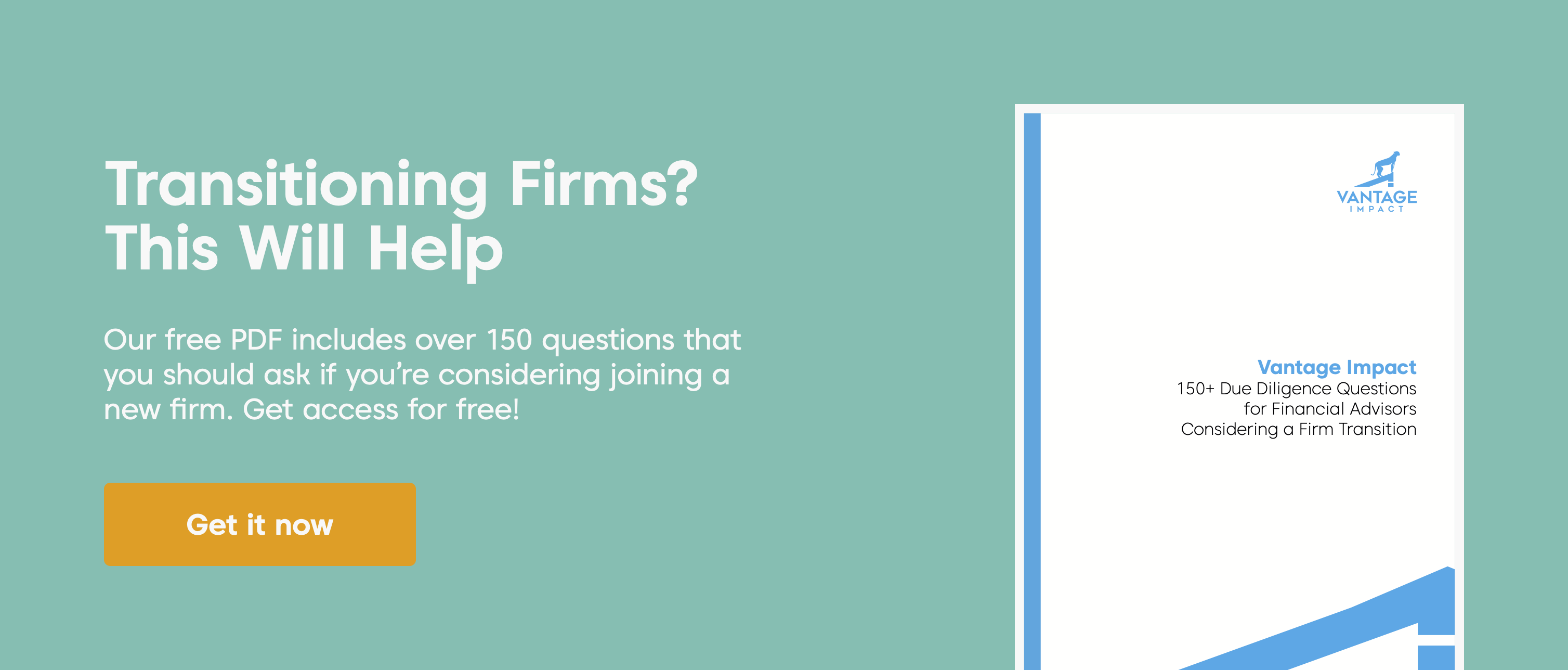Are you unsatisfied with your current situation or simply feel that you have outgrown your practice? It may be time to explore the possibility of transitioning to a new firm. You deserve the opportunity to grow and reach your full potential as a financial advisor, earning more for the work you put in.
The idea of moving to a new firm and expanding your earning potential can be exciting, thrilling even, but there are so many different variables to consider. This next step in your career calls for strategic thinking, a way to carefully evaluate all your options in the industry. You need to know what to expect from other firms and analyze how your current circumstances both compare and contrast so you can make the best possible career decision.
While there are important actions to take and questions to ask as an advisor before officially deciding to move firms, it may help to narrow your focus as you start this journey and begin with the end in mind: a formal offer to join a new firm. How will a new firm determine what your offer should be? What types of things will the new firms consider? We recommend all financial advisors reflect on how these eight essential factors can impact your future offer.
Note: Are you trying to figure out how to analyze an offer that’s already on the table? Here are 15 things to consider about your new offer.
1. Firm Type
What does your specific employment history as a financial advisor look like?
New firms will consider both the type and protocol status of firms you have worked at in the past. Any move to a new job can be stressful and have its challenges, but some advisor transitions can be more difficult in the financial services industry. Not all types of advisor positions are the same. If you are used to operating independently, you may not be accustomed to the same level of risk and following protocols required by a wirehouse. If your past employer was an insurance company or discount broker, there may be a sharp learning curve in taking an advisor position at a bank. Depending on the type of firm you are pursuing, you need to expect that your work history will be scrutinized in detail, and it will impact your formal offer.
2. Length in Service
How long have you conducted business and been licensed to offer financial advice?
The length in industry is telling for firms because an advisor’s trajectory is a key determination when hiring and can provide insight into whether this will be a growth or value type offer that they are extending. For this reason, firms look at if you’ve been producing $1 million and have only worked 3 years with a different eye than if you’ve been producing $1 million and have worked in the industry for 30 years. Advisors who demonstrate above average production expected for their length of service can leverage their previous success for a better offer.
3. Length of Employment with Current Firm
How long have you been employed with your current firm?
Every firm wants to know if their hiring and onboarding efforts will pay out. If you have only been with your current firm for 2 or 3 years, this could raise a red flag. Statistics show that if a financial advisor has moved around to several firms within the past five years, it could be indicative of a negative pattern. That’s not to say that one cannot have good reasons for switching firms, but you should be prepared to provide the details.
On the flip side, a lengthy tenure at your current firm signifies loyalty and commitment, and you can expect the new firm’s offer to reflect optimism about your future growth. Perhaps you have been at a firm you once loved for 10 or more years, but it has been molded and shaped into a completely different situation over time. Maybe the firm has changed policies or faced reputational issues. Regardless of the current circumstances, a lengthier tenure is looked at with less scrutiny, and the reason for switching firms is easier for advisors to articulate and turn around into a better offer.
4. Overall Revenue
As a financial advisor, what is your TTM (trailing 12 months)?
Each firm looks to the advisor’s revenue associated with their practice and book of business. They look at how much you produce and your overall production trends. Are you someone whose production increases incrementally over time? Or, are you someone whose numbers have high spikes and big drops each year? Firms will observe and measure your consistency versus high volatility tendencies and demonstrate their comfort level with the details of the offer.
Are you a high performer looking for negotiation strategies to maximize your next offer? Check out our article How to Negotiate Like a Pro: 6 Techniques for Financial Advisors.
5. Credit Review
What does your credit report say about you as a financial advisor and individual?
A financial advisor’s credit review is a key consideration. Firms rarely ask questions if one’s credit score is over 700. However, if it is somewhere in the 650-700 range, this tends to provoke questions. And, if it is lower than 650, it is worth your time to articulate a plausible story. Positive credit situations tend to indicate a more diligent financial advisor, and there is a correlation between an advisor’s credit score being positive and the ability to ramp up business at a new firm. Seamless transition is key for firms. If you know you are going to switch firms soon, look into your credit utilization and possibly even call your credit companies to increase limits if needed.
6. Broker Check and Background Check
What does your broker check and background check say about you?
Like an advisor’s credit score, one’s broker check is a crucial consideration. It is prudent to conduct a broker check on your own to see what is revealed. If you have liens on your home or other assets, or if several situations are revealed on your check, this warrants an explanation. Also, you should consider whether complaints should be arbitrated before switching firms. If there are several complaints but they have been denied, this should not be a major point of concern for you.
Similarly, you know your background better than anyone. If you know there is something that will come up, it is advisable to draft a letter of explanation, and possibly work with a lawyer to put you in the best possible position. It is helpful to list out the circumstances and provide context. Doing your due diligence beforehand can lead to a better offer.
7. Assets Under Management and Number of Clients
What is the total value of the assets under your management and how many clients do you have?
Firms want to know the total value of your managed assets and their specific product lines. This might as well be considered the total “pie” for an advisor and your worth as an advisor to the new firm. The profit margin for each asset will also be evaluated as part of the assessment.
The new firm will also compare your total assets with the total number of clients you are managing. If you are working with a significant number of clients, it may be difficult to expect them to switch over with you to the new firm. On the other hand, if you have less clients generating a significant amount of wealth, the new firm might feel better about the possibility of you bringing over your clients successfully. Firms like to see a return on assets right around 1X.
Pro Tip:
Strategic communications help clients understand why you’re transitioning to a new partner firm and are essential for strong client retention. Your stakeholders will stand by you if they have a clear understanding of the value. Looking for an expert strategic communications team to assist you? Let’s talk.
8. Product Portability of All Assets
How portable are the products that you currently manage?
When conducting an assessment of your total assets, the new firm will consider the mobility of the products and whether or not they can be transferred over. In thinking about your product lines, have you primarily sold proprietary products or packaged products that are difficult to unwind?
Any reputable firm with experience in onboarding successful financial advisors should provide a portability summary that details all the assets that you manage and what product line they are in. This type of information should provide advisors with the assurance that investments your clients own are eligible to be transferred. Without it, you stand the risk of a huge unexpected surprise early on in your transition.
The key in all of this is to confirm that a majority of the products you previously sold are portable to a new firm. Otherwise advisors run the risk of major clients needing to unnecessarily sell investments or be left behind at your prior firm altogether.
Joining a new firm can be a life and career-changing event, but there are many factors that will impact your potential offer. If you have any further questions about the process or would like to talk to an expert about exploring some options, do not hesitate to reach out and set up a conversation.



